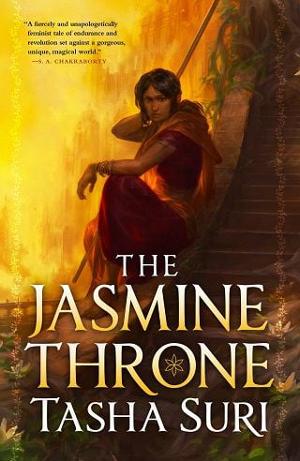Chapter 35: Ashok
ASHOK
“So how do we proceed then?”
“Proceed?” Kritika’s voice was deferent, as it always was. Ah, ever-watchful Kritika.
“What,” said the man, an edge of impatience in his voice, “will you give us for the weapons?”
The men before him were Ahiranyi and Srugani, and they’d taken this village, abandoned when the rot overran it, as their own. Someone had done a poor job burning the rot away, and it still hung about them: vivid flowers hanging from the walls, slick and venom-bright. Great curling roots, pulsing with a fleshy sentience, poured through the cracks in the floors. Most of the men had some hint of rot about them: a dust of strangeness to the veins of their hands, or pollen in their hair, or a quality of bark to their faces.
They wore sacred wood, for what little good it would do them. It was the only reason they weren’t all yet dead.
Ashok and the brothers and sisters who’d joined him in drinking the deathless waters were safe from the rot, or so it seemed. The rest of his followers had taken suitable precautions, and wore cloth bound about their mouths and noses, their hands swathed in gloves, beads of sacred wood bound on long threads around their throats.
These thugs—this militia—had nothing to live for and no one else willing to barter with them. Although rot couldn’t be spread between people, the rot-riven were still shunned. There were precious few other gangs that would consider causing them harm, but none would trade with them either, and from the pinched look of the man’s face, the starkness of his cheekbones, food was running scarce. It made them both willing to sell their fine weapons for any ridiculously low barter they could manage, and also made them entirely volatile. Either Ashok’s people would leave with everything they wanted, or the thugs would try to ensure they left with nothing at all.
Ashok was half tempted to throw a bag of rice on the floor, just to see what they would do. But instead he chose to be sensible. “I’m not unreasonable. I—”
It hit him, then. Like a wave. Starry power rushing through him. The feel of her, through the bed of the undergrowth, the sap veins of the forest, the drumming heart of it all. He felt it through the root that had wormed its way inside him, when he’d entered the waters once, then twice, hollowing himself so the river was forever winding inside him, binding him to the source.
Kritika whirled to look at him.
“What’s wrong with him?” the man asked.
One of Ashok’s own boys took him by the arm. Acting as a crutch, the boy led Ashok out of the hut, the two of them lumbering into the light.
“Don’t worry,” he heard Kritika say. “We’re not actually here for your weapons, after all…”
Two more of his people waited outside the doors. They ushered him away, into the shadow beneath the trees, away from the suspicious eyes of the rot-riven men.
Without guidance from him, his followers fell into line, guarding him in a loose circle, their scythes ready and their feet grimly planted.
“What happened?” asked one.
“I need silence,” he said. “Please.”
They nodded in acknowledgment. The barrier closed in tighter.
Priya. She’d found the way.
His equilibrium steadied, his pulse settling into a less frenetic rhythm. He needed to be calm. He breathed and breathed. He needed to enter the sangam.
He entered like a creature stumbling, ungainly. Fell to his knees in the water.
“Priya!”
He had trained her. He had made her. He’d kept her safe, when everyone else had died and they’d had nothing but each other.
“Priya!”
He’d begged coin and food from strangers. Or threatened them for it. When he’d begun to grow sick—blood in his cough, his lungs bands of agony—he’d knifed a man for the parcel of food tucked under his arm. He’d watched her eat it and been glad he had strength enough to kill for her, terrified that he would soon not even have that.
He’d given her up. Abandoned her to Bhumika, their sister who had looked like a stranger, with her finely woven saris and her cold eyes, her husband whose hands were stained in their siblings’ blood. He’d cut out his heart. When he’d been a dying boy and nothing but that, Priya had been his heart.
He yelled for her in the sangam and she did not come.
The water moved around him. He felt Bhumika, the alarm of her, across the water. But she knew as well as he did what had happened; felt it through whatever bonded them, temple-raised and gifted, together.
He realized then that Priya was not coming.
The girl he’d saved. The girl he’d abandoned.
Fine. So be it.
She had the deathless waters. She’d opened the way. And the way was all he needed.
He returned to his flesh. His family of followers had surrounded him in a circle, all thirty of them looking down at him.
Some held metal weapons. Others, stakes and staves carved from sacred wood, burning with heat and the promise of violence.
Kritika crossed through them. She was wiping her scythe clean of blood.
“We’ve dealt with those men,” said Kritika. “And we have what we need.”
They were always underestimated, until they drew on their masks.
They still had safe houses untouched and unknown by the regent. But they needed food and weapons and sources of coin. The nobility who had funded them were more wary, after the attack on Lord Iskar, unsure of what would happen under Lord Santosh’s regency. And his regency was coming, sure as the sunrise.
But these rot-riven outcasts had also possessed something Ashok needed far more than food.
“You have it?”
Kritika nodded and held it forward.
The villagers had once had a proper traditional village council. Most of their wealth had been stripped away by the carrion birds that were the militia and any other bandits or desperate folk who had passed through the region, but no one had taken the most precious item the council had once possessed.
It looked like a sack of odds and ends: bottles of glass or wood or dried leather, bound bead-tight. Nothing of worth, to ignorant eyes.
He reached in. Felt that pull, that poisonous yearning. Pulled out the vials of deathless water, one by one.
They buried the bodies. He took three of the strongest of his followers with him to do it. Then, as they made their camp a safe distance away, he told his followers everything.
Kritika was silent for a long moment. Behind her, around her, the others listened and waited, watchful. Then she said, “What shall we do, Ashok?”
He thought of Priya. Trying to make her strong.
The absence of her.
“We find her,” he said, “and we take the way from her. Being strong means doing what is necessary, no matter the cost.”
Kritika nodded. “Then you will allow us all to drink the water with you,” she said. “And join you in saving our country.”
Thirty drinking. A high number. They would need more water to sustain them, and Ashok—who had spent years sourcing vials of deathless water—knew it wouldn’t be possible. If they drank today, this would be a final gambit. If they did not find the deathless waters soon, it would be the literal death of them.
“You have sacrificed enough. I cannot ask this of all of you.”
“I am older than you, Ashok, but not as old as you seem to think,” Kritika said, with her usual gravity. “I still have the desire in me to seek freedom. To burn Parijatdvipa’s soldiers and lords and see the regent strung from his neck. Allow me that. Allow us all that.”
“We may all die,” said Ashok, finally. “We may not obtain my sister. We may be killed by Parijatdvipa’s men. This may be our end.”
Kritika said nothing. She knew the shape of Ashok’s thoughts, his words, his silence. She knew he was not done.
“Knowing this may be our death,” he said slowly, “knowing this may be the last time we are so strong, we should destroy as many of our targets as possible. The nobles and the wealthiest, the merchants and physicians that Parijatdvipa needs to keep its claws in our land—we need to kill them all. Whether we obtain my sister or not, we must have some sort of victory.” He looked at Kritika. “Are you ready?” he asked. “Are you ready to risk everything we have?”
“You have prepared for it,” said Kritika. “We all have.”
Yes. They’d accumulated weapons. They had loyal men and women, and the people they’d bought loyalty from too, with fear or hope or coin or some alchemical combination of all three.
“A little poison,” said Ganam, “is something I am willing to take.”
“We all are,” said another boy. “For this, we all are.”
His mind was moving, bird-swift. They could leave the ones who could not fight in the forest. The youngest and oldest. The rest…
The rest were already standing before him. The men and women who had allied to see Ahiranya free. Who rejected the shackles of outside rule. Who sought better than the rot that had stolen their homes and killed their loved ones; the hunger that followed when the regent did not care to ensure that they were fed.
And Kritika, the woman who had saved him when he had thought he would die, her lined face already set and implacable. She knew what was coming. They all did.
“We can’t be cautious any longer,” he said. “You’re right. Care has not won us anything. This is our last stand. Our last howl of rage. Let us show them that we are heirs to the forest, brothers and sisters. Heirs to the deathless waters. Let us show them tooth and claw and put an end to Parijati rule.”
Kritika apportioned out the vials. Only a taste. It only required a taste.
She placed a vial in his hand, too. His fingers trembled. He did not have long.
“We’re taking the Hirana. We’re taking its magic,” he said. “We’re taking Ahiranya.”
“A last stand,” said Kritika.
The circle around him lifted the vials and drank.
 Fullepub
Fullepub 



